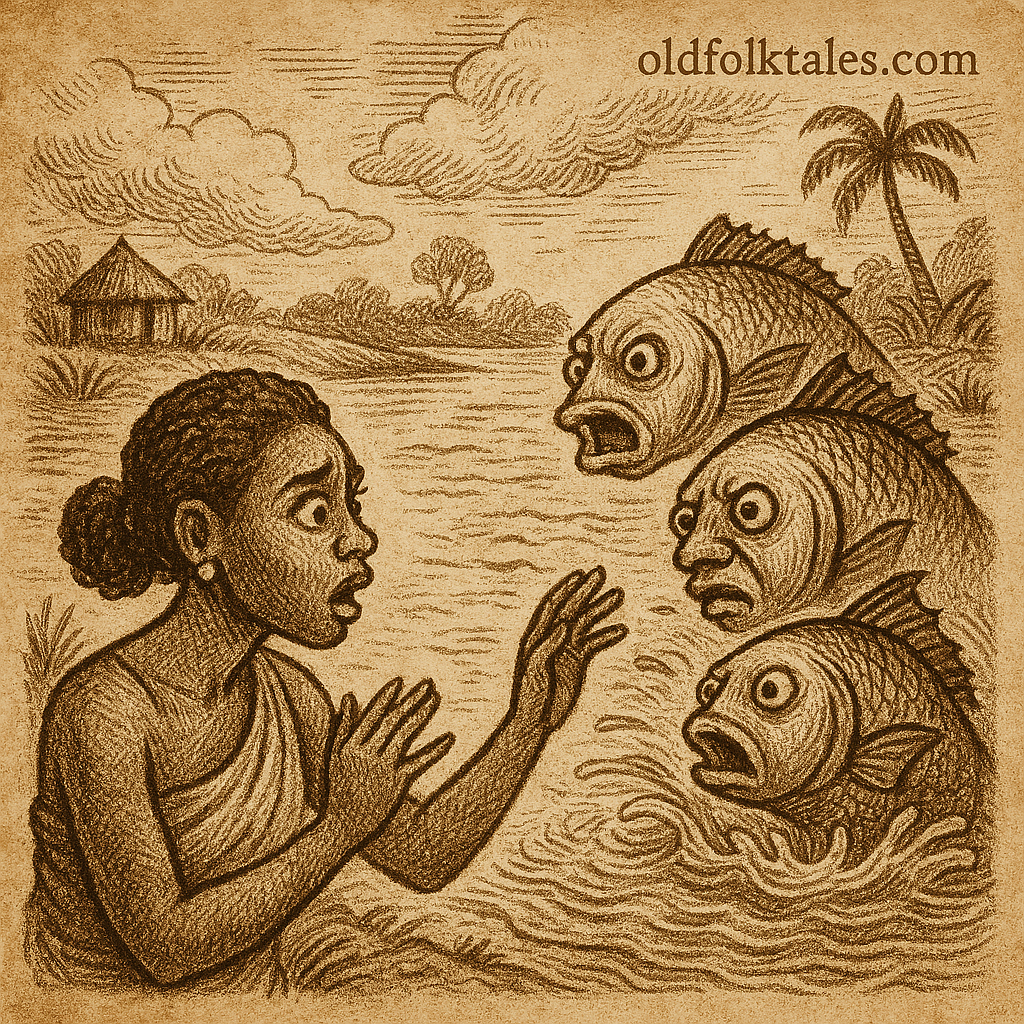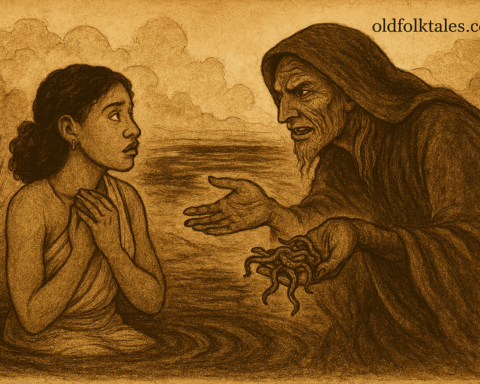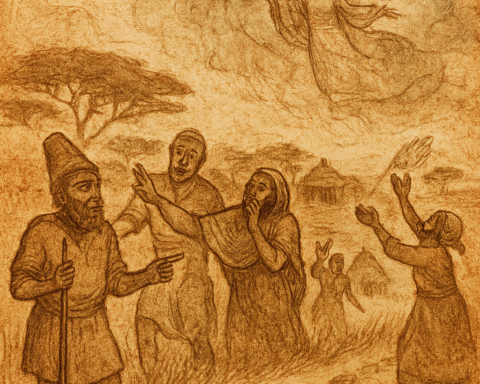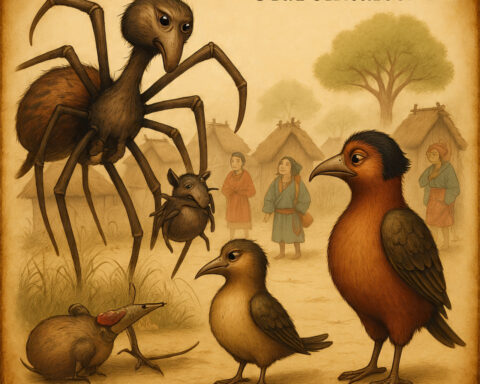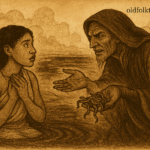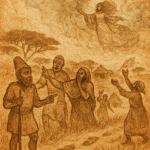In a village where the morning mist clung to thatched roofs like ancestral spirits watching over their descendants, there lived a young woman whose heart burned with an insatiable hunger for material wealth. Her beauty was undeniable, with skin that glowed like polished amber and eyes that sparkled with intelligence, but these gifts had been overshadowed by a consuming obsession that would ultimately seal her fate.
Unlike other young women who dreamed of love, companionship, and family harmony, this woman had allowed avarice to take root in her soul like a poisonous vine. She spent her days counting imaginary riches and her nights dreaming of luxuries that gleamed like gold in the moonlight. When suitors came to her father’s compound seeking her hand in marriage, she would examine them not with the eyes of a potential wife, but with the calculating gaze of a merchant appraising goods in the marketplace.
One by one, honest young men with kind hearts and steady hands were turned away from her door. Farmers who could provide food and security, craftsmen whose skills could build comfortable homes, and traders with modest but reliable incomes all found themselves dismissed with cruel words that cut deeper than any blade.
Also read: Makuchi and the Head without the body
“I want to marry a rich man,” she declared boldly to anyone who would listen, her voice ringing with stubborn determination across the village square. “Why do men with empty pockets come to ask for my hand? Why should I settle for scraping by when I could live in luxury? I must marry a man of true wealth, someone who can shower me with the riches I deserve!”
Her reputation for material obsession spread like wildfire across hills, valleys, and mountains, carried by traveling merchants, wandering griots, and market women who shook their heads in disapproval as they shared her story. The tale of the wealth-seeking woman became a cautionary song that echoed through distant settlements, spoken in hushed tones around cooking fires and whispered during the quiet hours before dawn.
Far beneath the surface of the great river that wound through the heart of the region, three mbwe (fish spirits) heard these songs about the wealth-obsessed woman. These supernatural beings, ancient as the waters themselves, possessed the power to take human form and move freely between the world of spirits and the realm of mortals. Intrigued by stories of such consuming greed, they decided to test this woman’s character and perhaps teach her a lesson about the dangers of prioritizing material wealth above all else.
With supernatural cunning, the three fish spirits borrowed human forms of extraordinary handsomeness, their borrowed bodies radiating health and prosperity. They acquired a magnificent automobile, the kind of gleaming metal beast that had never been seen in rural villages, with chrome that caught sunlight like captured stars and an engine that purred with mechanical power.
When they drove into her village, the car’s arrival caused a sensation that rippled through the community like stones thrown into still water. Children ran alongside the vehicle, their bare feet kicking up clouds of red dust as they marveled at this mechanical wonder. Adults emerged from their homes, shading their eyes against the sun as they stared in amazement at technology that seemed to have descended from the heavens themselves.
The moment the wealth-seeking woman saw the automobile, her heart leaped with savage joy that transformed her features into a mask of triumphant greed. Her eyes widened with desire so intense it seemed to burn like flame, and her hands clasped together as if she were holding her dreams made manifest.
“That is my husband!” she declared with absolute certainty, pointing at the handsome stranger behind the wheel with trembling fingers. “The man driving that beautiful car is destined to be my husband! Finally, finally, a suitor worthy of my standards has arrived!”
The marriage negotiations were arranged with unprecedented speed, her family overwhelmed by the apparent wealth and sophistication of the mysterious visitors. The bride price was paid with such generosity that it seemed to confirm every dream of prosperity the woman had ever harbored. Gold coins flowed like water, fine cloths were stacked like rainbow clouds, and promises of endless luxury filled the air like intoxicating perfume.
They departed that very night under stars that seemed to wink with knowing malice, the woman’s heart soaring with victory as she settled into the comfortable seat beside her handsome husband. The engine’s steady rhythm seemed to sing songs of the wealthy future that awaited her, and she imagined herself adorned with jewels and surrounded by servants who would fulfill her every desire.
But as they traveled deeper into the darkness, far from the protective boundaries of her village and the watchful eyes of her family, the terrible truth began to unfold like a flower of horror blooming in moonlight. First, her husband stopped the car and gave it away to a shadowy figure that emerged from the roadside, claiming casually that one tire needed repair and it would be easier to simply gift the vehicle than deal with mechanical troubles.
The woman’s protests died in her throat as she watched her symbol of wealth disappear into the night, but her husband assured her with smooth words that another, even more magnificent car awaited them at their destination. Then, to her growing alarm, he began removing his fine clothes piece by piece, handing them to mysterious strangers who appeared and vanished like smoke, claiming that each garment needed washing and would be returned later.
With each item of clothing that disappeared, more of her husband seemed to dissolve as well. His borrowed hands were returned to their original owners, then his feet, his strong torso, his proud neck, each body part vanishing until the horrible truth stood revealed in all its supernatural terror. Her husband and his two companions were nothing more than three air-deprived fish, their gills gasping desperately as they hopped frantically toward the life-giving waters of the river.
At the water’s edge, where reeds whispered secrets to the night wind and the current carried the dreams of the drowned, her fish-husband turned to face her one final time. His bulging eyes reflected moonlight like tears as he begged her to return home, his voice carrying the weight of genuine concern despite his supernatural nature.
“You cannot swim,” he warned her with desperate urgency, his words punctuated by the gasping sounds of a creature dying for lack of water. “If you enter these waters, you will surely drown. Please, go back to your village while you still can. Find happiness in simpler things, in human love and mortal companionship.”
Each of the three brothers sang mournfully in voices that seemed to rise from the depths of ancient waters, their words creating a haunting melody that spoke of endings and consequences:
“Owerri go home ramara We live in the deep ramara
She who cannot swim ramara Will perish in the deep ramara”
Their song echoed across the water like a funeral dirge, carried by currents that had witnessed countless tragedies and would witness countless more. But the stubborn woman, her heart still poisoned by greed and her mind clouded by the loss of her material dreams, refused to heed their warnings.
“I will not return home empty-handed,” she declared with the fierce pride that had brought her to this moment of doom. “I followed you here for wealth, and I will not leave without it.”
When the last fish disappeared beneath the dark waves with barely a ripple to mark their passage, she stood alone on the muddy shore. The silence that followed was more terrible than any sound, broken only by the gentle lapping of water against the bank and the distant cry of night birds mourning the living.
For hours she stood there weeping, her tears falling like rain into the river that had swallowed her dreams of prosperity. When her tears were finally exhausted and her eyes could produce no more moisture, she spoke softly into the darkness, her voice barely audible above the water’s whisper:
“Only the knife knows what the cocoyam feels,” she murmured, acknowledging at last the pain that comes from cutting away everything valuable in pursuit of impossible dreams.
With those final words of bitter wisdom, she threw herself into the river’s embrace. The dark waters closed over her head without ceremony or fanfare, and the mbwe, according to the ancient laws that govern such supernatural encounters, consumed her body, completing the tragic cycle she had set in motion with her own greedy choices.
Moral Lesson
This tragic folktale serves as a powerful warning about the destructive nature of greed and materialism. The wealth-seeking woman’s obsession with riches blinded her to the value of genuine human connection and led her to reject honest suitors in favor of supernatural deception. Her story teaches us that the pursuit of material wealth above all else can lead to spiritual poverty and ultimate destruction, while true happiness is found in appreciating what we have and valuing character over possessions.
Knowledge Check
Q1: Who is the wealth-seeking woman and what character flaw drives the story’s tragic events? A: The wealth-seeking woman is a beautiful but greedy protagonist whose obsession with material wealth leads her to reject honest suitors and fall victim to supernatural deception by fish spirits pretending to offer riches.
Q2: What are mbwe and how do they deceive the wealth-obsessed woman? A: Mbwe are fish spirits from West African folklore who can borrow human forms. They deceive the woman by appearing as wealthy men with a car, then gradually reveal their true nature as they return borrowed body parts and head toward the river.
Q3: What role does the automobile play in the woman’s deception and downfall? A: The automobile serves as the primary symbol of wealth that attracts the woman to the fish spirits. When she sees the car, she immediately declares the driver to be her husband, showing how material possessions blind her to danger.
Q4: What is the meaning of the song “Owerri go home ramara” in the story? A: This mournful song represents the fish spirits’ final warning to the woman, telling her to return home because she cannot swim and will die if she follows them into the water, showing even supernatural beings can display mercy.
Q5: What cultural lesson about greed and contentment does this West African folktale convey? A: The story teaches that excessive greed leads to spiritual and physical destruction, while happiness comes from valuing human relationships and character over material wealth and status symbols.
Q6: How does the phrase “only the knife knows what the cocoyam feels” function as the story’s final wisdom? A: This traditional saying represents the woman’s final understanding of the pain caused by her choices, acknowledging that her pursuit of wealth has cut away everything truly valuable in her life, leading to her tragic end.
Source: The sacred door and other stories, Cameroon folktales of the Beba (1st ed.). Ohio University Press.
